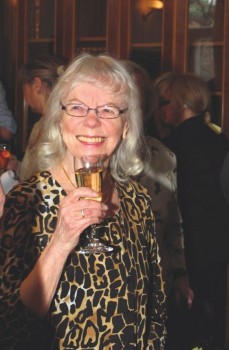In the mirror
5 April 2011 | Reviews

Aila Meriluoto. Photo: Tiina Pyrylä/WSOY
One of the more attractive aspects of Finnish literature is the juxtaposition of poetry-writing generations. 2011 sees the debut of both the 82-year-old Martta Rossi and new poets born in the 1980s.
Compared to them, the 87-year-old Aila Meriluoto is an old hand: Tämä täyteys, tämä paino (‘This fullness, this weight’, WSOY, 2011) is her 14th volume of poetry.
Since her first collection, which appeared 65 years ago, the grande dame has published more than 20 works: poetry, prose, diaries, books for children and young people, biographies and translations, among them poetry by Harry Martinson and Rainer Maria Rilke.
Meriluoto’s profile as a writer is an interesting combination of the much-lauded young writer and the critically acclaimed middle-aged, unrestrainedly confessional mother. Her first collection, Lasimaalaus (‘Glass painting’, 1946), was much loved by a wide public as a work that united the entire younger generation that had experienced the Second World War.
The adoring support of the great literary authority of the period, the poet and academician V.A. Koskenniemi (1885–1962), was instrumental in building a Meriluoto cult, and this connection was to cost her dear later in the 1950s. The young modernist generation saw her as an exponent of the older rhymed poetry and the conservative world of values that was associated with it.
Meriluoto’s prose work, too, had a mixed response in its time. After moving, together with her four children, to Sweden in 1962 following her divorce, the writer published a number of works describing her difficult marriage to the poet Lauri Viita (1916–1965). And that was not all: she also wrote about her erotic dreams and her new relationships with men in a way that did not accord with the literary taste of Finns.
Her intimate confessions of a mother-of-four and her descriptions of her difficult marriage to a fellow artist, however, gained a new audience in the 1990s: feminist thinking and literature had schooled new generations who considered Meriluoto courageous as a writer. It is interesting how the autobiographical writings of the Finland-Swedish writer Märta Tikkanen (born 1935) about her marriage and family have experienced the same kind of rise and fall in their literary reception.
In her new collection, Meriluoto continues to write in a limpid world characterised by the search for balance and the power of light. When the poems speak of the ‘stubborn altitude of a summer’s night’ and of ‘independent light’, we find ourselves once again face to face with the woman hungry for life, insistent upon her right to exist, who has been present in Meriluoto’s poetry all along.
The collection follows themes of ageing, renunciation and death, but all through the poet’s characteristically tough, slightly ironic gaze. Relationships between men and women still beguile her; the paradoxical ‘black light’ is linked with this eternal love affair between day and night.
The woman of the poems is an ‘extreme ballerina’ and a ‘white lily’, who still gazes into the mirror and ponders the relationship between the image and the perceiving subject. The girl in the mirror is now standing on her head and an old woman steps out of the wall.
The woman in the mirror is a poetic figure already familiar from Aila Meriluoto’s first collection: in ‘Kahlaajatyttö’ (‘The wading girl’), a man suddenly destroys the mirror of the water’s surface. In the new collection’s title poem, a wise speaker advises practising patience, calm, slowing down, and thus accepting the eternal present, the unbroken duration of present beauty.
Translated by Hildi Hawkins
Tags: poetry
No comments for this entry yet
